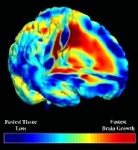Music in Early Childhood Boosts Cognition and Brain Health
Clinical research has confirmed other research that a child’s brain grows faster when learning music early on in life.
In this article
Children studied for music and brain health
The researchers, from the Montreal Neurological Institute and Hospital, tested 36 musicians, half of whom learned to play music before the age of seven and some who learned to play music after the age of seven. They found that those who had learned before the age of seven had larger areas of white matter in the corpus callosum – an area of the brain that connects the right and left motor cortices.
Those who started playing music before the age of seven had greater connections within the nerve fibers of this region.
Those musicians who began training later showed no difference in their brains than those who were not musicians.
Dr. Robert Zatorre, who is also a director at the International Laboratory for Brain Music and Sound Research, led the study. “This study is significant in showing that training is more effective at early ages because certain aspects of brain anatomy are more sensitive to changes at those time points,” Dr. Zatorre said.
Music lessons are probably the most applicable experience in this study. Those children who take music lessons – should those lessons begin at least by the age of 8 years old – should gain the benefit. This, however, doesn’t mean that learning a musical instrument early on without formal training would not also benefit the child.
The researchers found that those who had received training early in life also increased the person’s motor skills and timing – even skills unrelated to music.
Playing a musical instrument changes the brain
In another study, this one from Northwestern University, found that playing a musical instrument produces changes in the brainstem. The researchers found that those adults who received formal musical training during childhood had significantly greater brainstem responses to sound, and the level of their increased response related directly to the amount of musical training the child had. This greater brainstem response correlates with greater efficiency of the brain.
The evidence from this study points to the fact that this improvement among the brain carries on through adulthood, even if musical training is not continued.
Music throughout life is also considered to have substantial benefits. Lowered stress levels have been found among several studies.
REFERENCES:
Kar A. Early music lessons boost brain development. Neuro. Feb 2012.
Skoe E, Kraus N. A little goes a long way: how the adult brain is shaped by musical training in childhood. J Neurosci. 2012 Aug 22;32(34):11507-10.
Adams C. Total Harmonic: The Healing Power of Nature’s Elements. Logical Bks. 2012
















